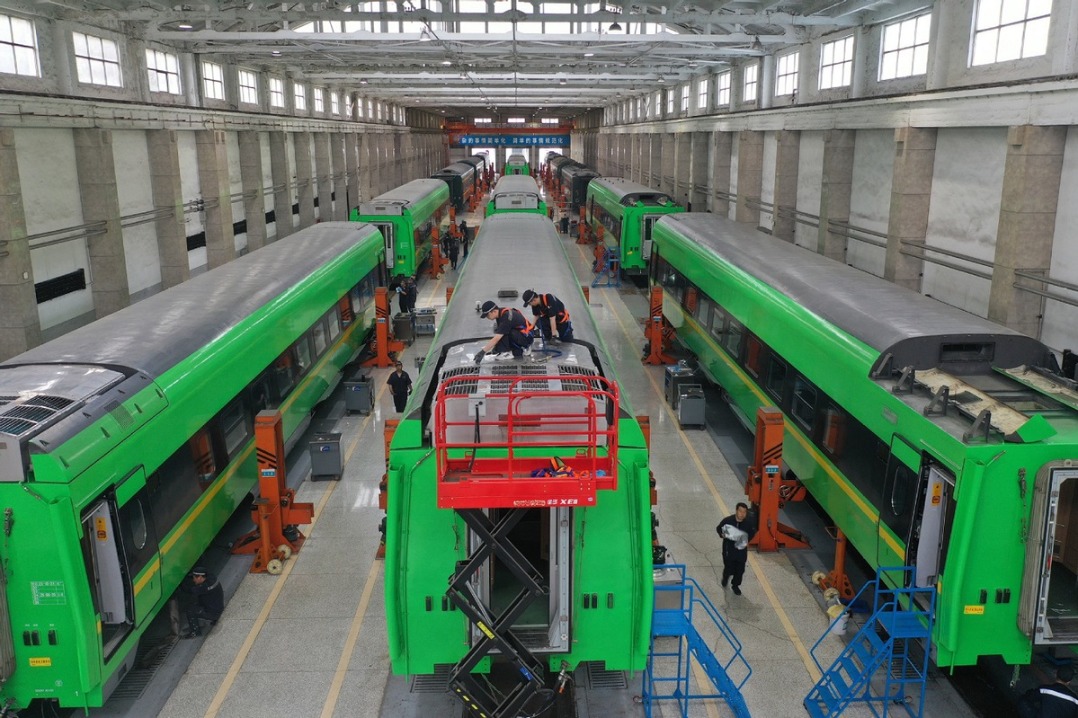Striding toward new era, despite challenges

One of the real highlights, for me at least, of covering the annual two sessions in Beijing is getting to spend time in the halls and corridors of the Great Hall of the People.
Anyone interested in modern Chinese history or architecture of any kind cannot help but be impressed, if not overwhelmed, by the splendor and symbolism of the building.
While there has been much mention at the meetings of this year's 70th anniversary of the founding of the People's Republic of China, one slightly overlooked fact is that the hall itself has its own 60th birthday this year, although one that is not entirely coincidental since it was built to mark the first decade of the PRC.
One relatively unknown feature of the Great Hall is that there is a hall within the building for every province, autonomous region, special administrative region and municipality in China.
During the meetings of the National People's Congress and the National Committee of the Chinese People's Political Consultative Conference, I had the opportunity to attend an open meeting of NPC deputies from Gansu in its hall, where on one wall there is a splendid mural of a landscape from the northwestern province.

There, I asked Zhang Haibo, president of the High People's Court of Gansu, about local policies to promote private sector development. This has been a big issue throughout the two sessions and it follows on from a number of commitments given to the private sector by President Xi Jinping over recent months, including those from a symposium on private enterprises in Beijing in November.
One of the key measures in the Government Work Report, which sets out the government agenda for the year and is always delivered after the opening of the NPC, was 2 trillion yuan ($298 billion) of tax cuts for private enterprises, many of them targeted at small and micro-sized businesses.
From Zhang, I got a clearer idea about how national-level policies are implemented at a local level. He said the province now has plans to further reduce taxes on its small and micro-sized businesses, on top of 347 million yuan of reductions last year. "We listen to the voice of enterprises, and directly try to address their problems and solve their difficulties," he said. "Private business is strongly related to the economy of the whole province. If private business thrives, then the economy of Gansu will be strong."
With just a day to go before it ends, one of the things that stands out about this year's two sessions has been the sheer number of policy announcements.
Wang Huiyao, president and founder of the Center for China and Globalization, an independent think tank based in Beijing, who was present in the Great Hall, as was I, when the work report was delivered, said he could not remember when so much practical policy had been brought forward.
"It broke the record. It was a very practical report with a number of important new policy announcements which are likely to bolster the economy," Wang told me.
The one thing that has attracted the most international attention is the draft foreign investment law.
It came before the NPC on March 8 and if approved on Friday, it will give foreign companies unprecedented access to the Chinese market. They will be offered "national treatment", meaning that they will be dealt with the same as Chinese companies.
There will be a reduction in the negative list of sectors in which they cannot operate, and they will be given greater intellectual property protection and no longer be subject to forced technology transfers.
It may or may not be enough for some foreign business lobby groups - sometimes you wonder what would be - but what often gets lost in this debate is that Chinese companies used to complain about the preferential treatment offered to overseas multinationals.
This was particularly the case in the 1980s, when China was seeking to attract overseas investment and foreign companies were offered a lot of incentives.
During the two sessions, I have written a number of reports on this issue and spoken to many in the business community and in other areas. Edward Lehman, managing director of Beijing-based Lehman, Lee& Xu, who has lived in China since the 1980s, said he believed the new law was a major step forward.
"I don't believe there has been as big an adjustment in the law as this since China's accession to the WTO in 2001," he said.
Any law change will not suddenly make operating in China easy, since domestic companies are becoming increasingly tough competitors.
Edward Tse, CEO and founder of Gao Feng Advisory, a management consultancy, and author of China's Disruptors: How Alibaba, Xiaomi, Tencent and Other Companies are Changing the Rules of Business, said their deployment of technology makes them difficult opponents.
"It is not all about the law. Chinese companies over the past 10 to 15 years have really advanced," Tse said. "Their use of technology, for example, is often at a higher level than Western companies. So, when, as a result of this change, foreign companies are allowed into new sectors, they will find much stiffer competition than perhaps they anticipate."
This is a sign that China is on the move and on target to become a global technological leader by 2035, the target set by Xi at the 19th National Congress of the Communist Party of China in October 2017.
Having covered the two sessions for nearly a decade, what you always come away with each time is a coming together and unity of purpose among the deputies and members who attend.
While I might have been occasionally distracted by the magnificence of the Great Hall, my sense of this mission was doubly the case this year.
This seems a country striding ever more confidently into a great new era, whatever the global challenges may be.
- Guideline aims to curb irregular cosmetic surgery pricing
- Committee formed in Guangzhou to guide the building of 'lake + green development zone'
- Shanghai Mint brings coins and medals to London
- Chinese customs seize over 40,000 fake Labubu toys
- Torrential rains cause flooding in Guangdong townships
- Xiamen artist captures fleeting wedding emotions on canvas






































